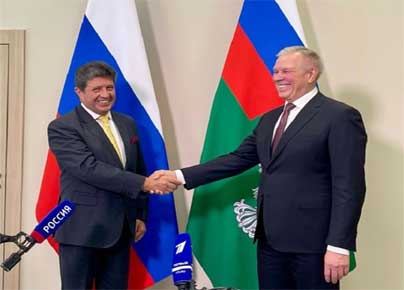Ecuador and Russia Forge Ahead After the Banana Dispute
2024-02-23

A significant development in international phytosanitary control has been reported. Russia and Ecuador have agreed on a memorandum concerning this critical agricultural health and safety aspect. Interfax, a non-governmental news agency based in Moscow, disclosed on February 22 that an agreement had been reached between Rosselkhoznadzor, Russia's Federal Service for Veterinary and Phytosanitary Supervision, and the Agriculture Quality Assurance Agency of Ecuador. The agreement pertains to a memorandum of understanding that outlines the specifics of implementing quarantine phytosanitary control at checkpoints. Rosselkhoznadzor confirmed in a statement that the parties had successfully agreed on the document's content and discussed its impending signing. This agreement resulted from productive video negotiations between Rosselkhoznadzor and its Ecuadorian counterparts. In a further
r development, both agencies have consented to sign a protocol to integrate their plant quarantine information systems. This integration is expected to facilitate the implementation of the memorandum's provisions, thereby enhancing the effectiveness of phytosanitary control measures. In a significant development, Rosselkhoznadzor, Russia's Federal Service for Veterinary and Phytosanitary Supervision, and the Ecuadorian Agriculture Quality Assurance Agency have been in negotiations to ensure the phytosanitary safety of certified bananas exported from Ecuador. Rosselkhoznadzor had previously appealed to the Ecuadorian Ministry of Agriculture and Livestock, requesting a suspension of banana certification from five Ecuadorian exporters.
This request, initiated on February 5, was due to the systematic detection of a quarantine pest considered dangerous for Russia and the EAEU countries - the polyphagous humpback fly. On February 16, a meeting was held between Sergei Dankvert, the head of Rosselkhoznadzor, and Juan Fernando Holguin Flores, the Ambassador of Ecuador to Russia. Initiated by the Ecuadorian side, the meeting concluded with Rosselkhoznadzor announcing the potential resumption of banana certification from the five exporters, provided they meet the Agency's guarantees. In response, Ecuador has ramped up inspections of bananas destined for Russia from these five exporters. A special quarantine zone has been established for loading bananas from plantations. Furthermore, the Ecuadorian Agency now mandates fruit exporters to implement integrated pest management, conduct staff training, perform additional container cleaning, and apply labelling for traceability purposes. The Ecuadorian side has extended an invitation to representatives of Rosselkhoznadzor to visit the country. The purpose of this visit is to visually verify the effectiveness of the measures being implemented regarding banana shipments. In a separate development, on February 23, CNN en Español reported that Ecuador's President Daniel Noboa confirmed his rejection of a previous government decision.
This decision involved sending old military equipment from the former Soviet Union, which the Andean country had agreed to, to the U.S. President Noboa's confirmation of this rejection was made during a television interview.
In January, the Ecuadorian government made a significant announcement. They revealed plans to send what they referred to as "Ukrainian and Russian scrap metal" to the United States. This exchange was not without its benefits; in return, Ecuador would receive modern equipment valued at $200 million. The intention behind this exchange was to bolster the country's efforts in combating the criminal bands and narcotraffickers that have been causing widespread terror.
However, in a recent interview with CNN Espanol, President Noboa expressed a change of heart regarding this decision. He disclosed that after learning about the planned delivery of the Soviet-era equipment to Ukraine, he decided against it. He stated that Ecuador does not wish to be involved in this transaction. President Noboa further emphasised the importance of Russia to Ecuador during the CNN interview.
He highlighted that Russia ranks as Ecuador's third most significant trading partner. Considering this, he expressed the country's commitment to uphold all international treaties, indicating that they have no intention of violating any such agreements.









